Research Project: Global Branding Strategy of Organic Coffee in UK
VerifiedAdded on 2023/01/19
|27
|8408
|80
Report
AI Summary
This report presents a research project focused on developing a global branding strategy for organic coffee within the UK market, specifically examining Nestle's approach. The introduction outlines the research background, aims, and objectives, emphasizing the importance of global branding in the competitive beverage market. The literature review explores the health benefits and quality of organic coffee, key factors driving its growth, and effective global brand strategies. The methodology section details the research methods, including qualitative and quantitative design, sample selection, data collection, and ethical considerations. The data presentation, analysis, and discussion chapter presents findings, while the research reflection critically analyzes the applied methods and suggests alternative methodologies. The report aims to identify strategies to increase demand for organic coffee, considering consumer behavior, market trends, and the impact of health benefits. The research employs a mixed-methods approach, utilizing questionnaires and thematic analysis to gather and analyze data. The project investigates the competitive landscape of the UK coffee market, the importance of global branding, and the potential for organic coffee to gain a competitive advantage. The research concludes with recommendations for Nestle to enhance its global branding strategy and increase its market share in the UK.
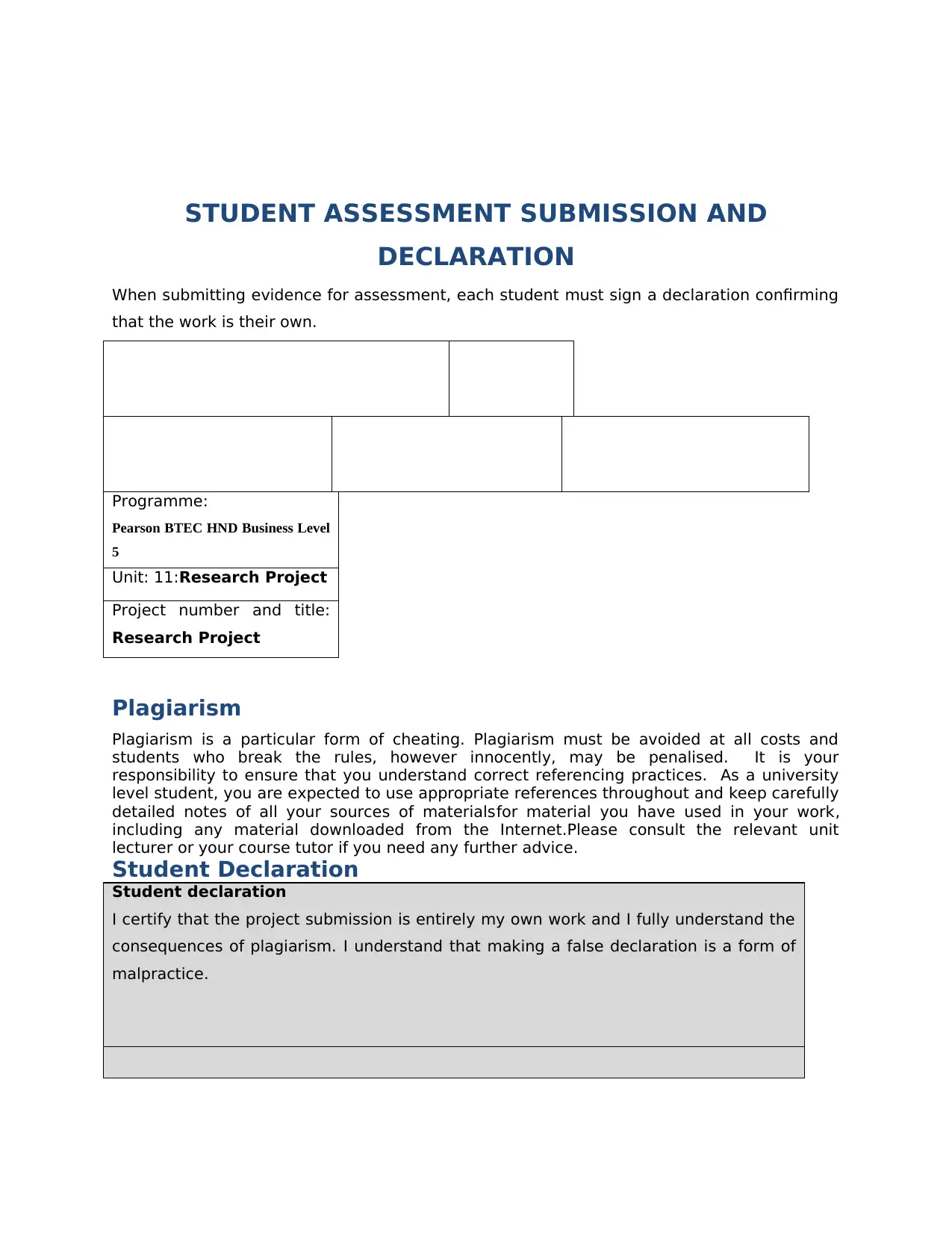
STUDENT ASSESSMENT SUBMISSION AND
DECLARATION
When submitting evidence for assessment, each student must sign a declaration confirming
that the work is their own.
Programme:
Pearson BTEC HND Business Level
5
Unit: 11:Research Project
Project number and title:
Research Project
Plagiarism
Plagiarism is a particular form of cheating. Plagiarism must be avoided at all costs and
students who break the rules, however innocently, may be penalised. It is your
responsibility to ensure that you understand correct referencing practices. As a university
level student, you are expected to use appropriate references throughout and keep carefully
detailed notes of all your sources of materialsfor material you have used in your work,
including any material downloaded from the Internet.Please consult the relevant unit
lecturer or your course tutor if you need any further advice.
Student Declaration
Student declaration
I certify that the project submission is entirely my own work and I fully understand the
consequences of plagiarism. I understand that making a false declaration is a form of
malpractice.
DECLARATION
When submitting evidence for assessment, each student must sign a declaration confirming
that the work is their own.
Programme:
Pearson BTEC HND Business Level
5
Unit: 11:Research Project
Project number and title:
Research Project
Plagiarism
Plagiarism is a particular form of cheating. Plagiarism must be avoided at all costs and
students who break the rules, however innocently, may be penalised. It is your
responsibility to ensure that you understand correct referencing practices. As a university
level student, you are expected to use appropriate references throughout and keep carefully
detailed notes of all your sources of materialsfor material you have used in your work,
including any material downloaded from the Internet.Please consult the relevant unit
lecturer or your course tutor if you need any further advice.
Student Declaration
Student declaration
I certify that the project submission is entirely my own work and I fully understand the
consequences of plagiarism. I understand that making a false declaration is a form of
malpractice.
Paraphrase This Document
Need a fresh take? Get an instant paraphrase of this document with our AI Paraphraser
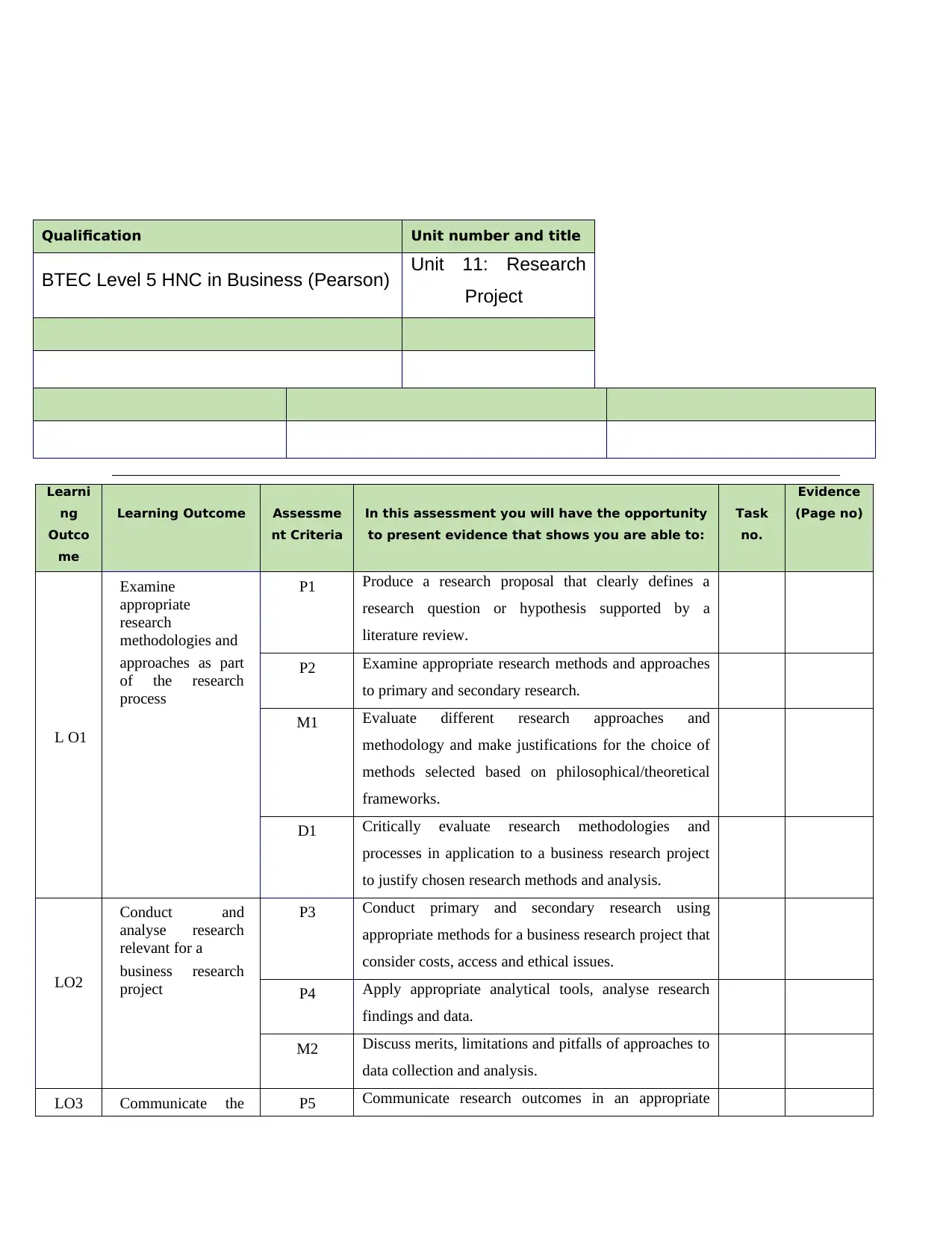
Qualification Unit number and title
BTEC Level 5 HNC in Business (Pearson) Unit 11: Research
Project
Learni
ng
Outco
me
Learning Outcome Assessme
nt Criteria
In this assessment you will have the opportunity
to present evidence that shows you are able to:
Task
no.
Evidence
(Page no)
L O1
Examine
appropriate
research
methodologies and
approaches as part
of the research
process
P1 Produce a research proposal that clearly defines a
research question or hypothesis supported by a
literature review.
P2 Examine appropriate research methods and approaches
to primary and secondary research.
M1 Evaluate different research approaches and
methodology and make justifications for the choice of
methods selected based on philosophical/theoretical
frameworks.
D1 Critically evaluate research methodologies and
processes in application to a business research project
to justify chosen research methods and analysis.
LO2
Conduct and
analyse research
relevant for a
business research
project
P3 Conduct primary and secondary research using
appropriate methods for a business research project that
consider costs, access and ethical issues.
P4 Apply appropriate analytical tools, analyse research
findings and data.
M2 Discuss merits, limitations and pitfalls of approaches to
data collection and analysis.
LO3 Communicate the P5 Communicate research outcomes in an appropriate
BTEC Level 5 HNC in Business (Pearson) Unit 11: Research
Project
Learni
ng
Outco
me
Learning Outcome Assessme
nt Criteria
In this assessment you will have the opportunity
to present evidence that shows you are able to:
Task
no.
Evidence
(Page no)
L O1
Examine
appropriate
research
methodologies and
approaches as part
of the research
process
P1 Produce a research proposal that clearly defines a
research question or hypothesis supported by a
literature review.
P2 Examine appropriate research methods and approaches
to primary and secondary research.
M1 Evaluate different research approaches and
methodology and make justifications for the choice of
methods selected based on philosophical/theoretical
frameworks.
D1 Critically evaluate research methodologies and
processes in application to a business research project
to justify chosen research methods and analysis.
LO2
Conduct and
analyse research
relevant for a
business research
project
P3 Conduct primary and secondary research using
appropriate methods for a business research project that
consider costs, access and ethical issues.
P4 Apply appropriate analytical tools, analyse research
findings and data.
M2 Discuss merits, limitations and pitfalls of approaches to
data collection and analysis.
LO3 Communicate the P5 Communicate research outcomes in an appropriate
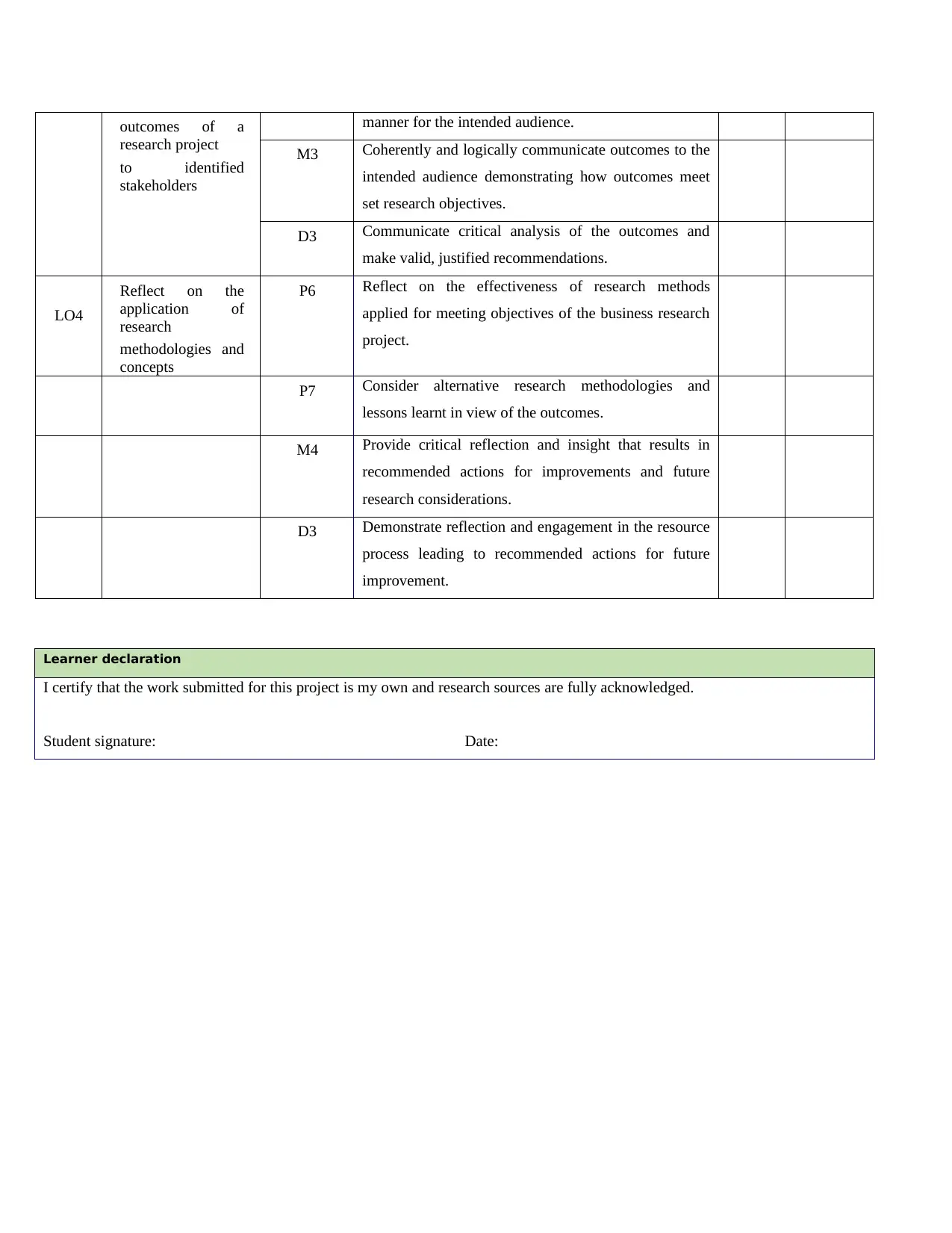
outcomes of a
research project
to identified
stakeholders
manner for the intended audience.
M3 Coherently and logically communicate outcomes to the
intended audience demonstrating how outcomes meet
set research objectives.
D3 Communicate critical analysis of the outcomes and
make valid, justified recommendations.
LO4
Reflect on the
application of
research
methodologies and
concepts
P6 Reflect on the effectiveness of research methods
applied for meeting objectives of the business research
project.
P7 Consider alternative research methodologies and
lessons learnt in view of the outcomes.
M4 Provide critical reflection and insight that results in
recommended actions for improvements and future
research considerations.
D3 Demonstrate reflection and engagement in the resource
process leading to recommended actions for future
improvement.
Learner declaration
I certify that the work submitted for this project is my own and research sources are fully acknowledged.
Student signature: Date:
research project
to identified
stakeholders
manner for the intended audience.
M3 Coherently and logically communicate outcomes to the
intended audience demonstrating how outcomes meet
set research objectives.
D3 Communicate critical analysis of the outcomes and
make valid, justified recommendations.
LO4
Reflect on the
application of
research
methodologies and
concepts
P6 Reflect on the effectiveness of research methods
applied for meeting objectives of the business research
project.
P7 Consider alternative research methodologies and
lessons learnt in view of the outcomes.
M4 Provide critical reflection and insight that results in
recommended actions for improvements and future
research considerations.
D3 Demonstrate reflection and engagement in the resource
process leading to recommended actions for future
improvement.
Learner declaration
I certify that the work submitted for this project is my own and research sources are fully acknowledged.
Student signature: Date:
⊘ This is a preview!⊘
Do you want full access?
Subscribe today to unlock all pages.

Trusted by 1+ million students worldwide
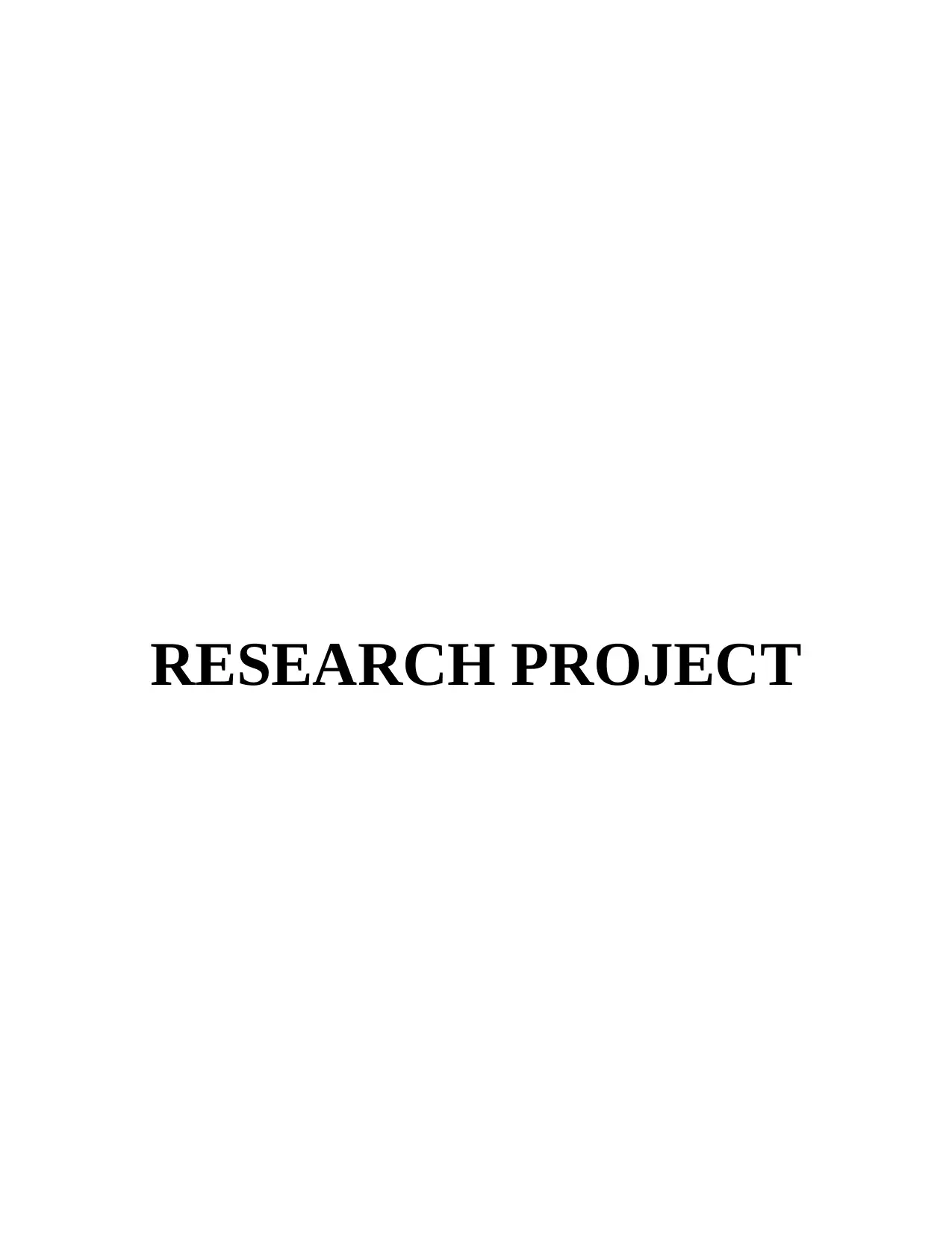
RESEARCH PROJECT
Paraphrase This Document
Need a fresh take? Get an instant paraphrase of this document with our AI Paraphraser
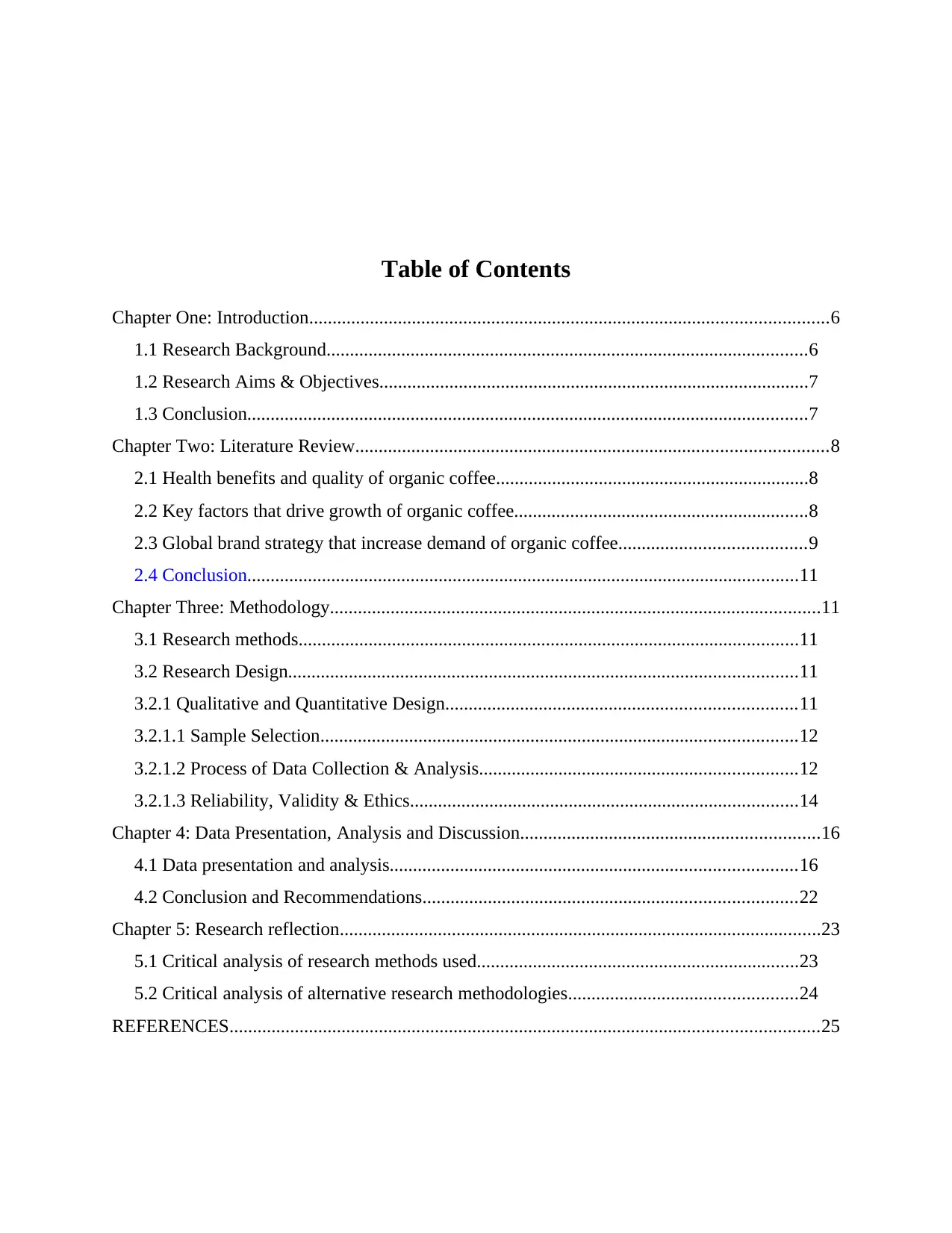
Table of Contents
Chapter One: Introduction...............................................................................................................6
1.1 Research Background.......................................................................................................6
1.2 Research Aims & Objectives............................................................................................7
1.3 Conclusion........................................................................................................................7
Chapter Two: Literature Review.....................................................................................................8
2.1 Health benefits and quality of organic coffee...................................................................8
2.2 Key factors that drive growth of organic coffee...............................................................8
2.3 Global brand strategy that increase demand of organic coffee........................................9
2.4 Conclusion......................................................................................................................11
Chapter Three: Methodology.........................................................................................................11
3.1 Research methods...........................................................................................................11
3.2 Research Design.............................................................................................................11
3.2.1 Qualitative and Quantitative Design...........................................................................11
3.2.1.1 Sample Selection......................................................................................................12
3.2.1.2 Process of Data Collection & Analysis....................................................................12
3.2.1.3 Reliability, Validity & Ethics...................................................................................14
Chapter 4: Data Presentation, Analysis and Discussion................................................................16
4.1 Data presentation and analysis.......................................................................................16
4.2 Conclusion and Recommendations................................................................................22
Chapter 5: Research reflection.......................................................................................................23
5.1 Critical analysis of research methods used.....................................................................23
5.2 Critical analysis of alternative research methodologies.................................................24
REFERENCES..............................................................................................................................25
Chapter One: Introduction...............................................................................................................6
1.1 Research Background.......................................................................................................6
1.2 Research Aims & Objectives............................................................................................7
1.3 Conclusion........................................................................................................................7
Chapter Two: Literature Review.....................................................................................................8
2.1 Health benefits and quality of organic coffee...................................................................8
2.2 Key factors that drive growth of organic coffee...............................................................8
2.3 Global brand strategy that increase demand of organic coffee........................................9
2.4 Conclusion......................................................................................................................11
Chapter Three: Methodology.........................................................................................................11
3.1 Research methods...........................................................................................................11
3.2 Research Design.............................................................................................................11
3.2.1 Qualitative and Quantitative Design...........................................................................11
3.2.1.1 Sample Selection......................................................................................................12
3.2.1.2 Process of Data Collection & Analysis....................................................................12
3.2.1.3 Reliability, Validity & Ethics...................................................................................14
Chapter 4: Data Presentation, Analysis and Discussion................................................................16
4.1 Data presentation and analysis.......................................................................................16
4.2 Conclusion and Recommendations................................................................................22
Chapter 5: Research reflection.......................................................................................................23
5.1 Critical analysis of research methods used.....................................................................23
5.2 Critical analysis of alternative research methodologies.................................................24
REFERENCES..............................................................................................................................25
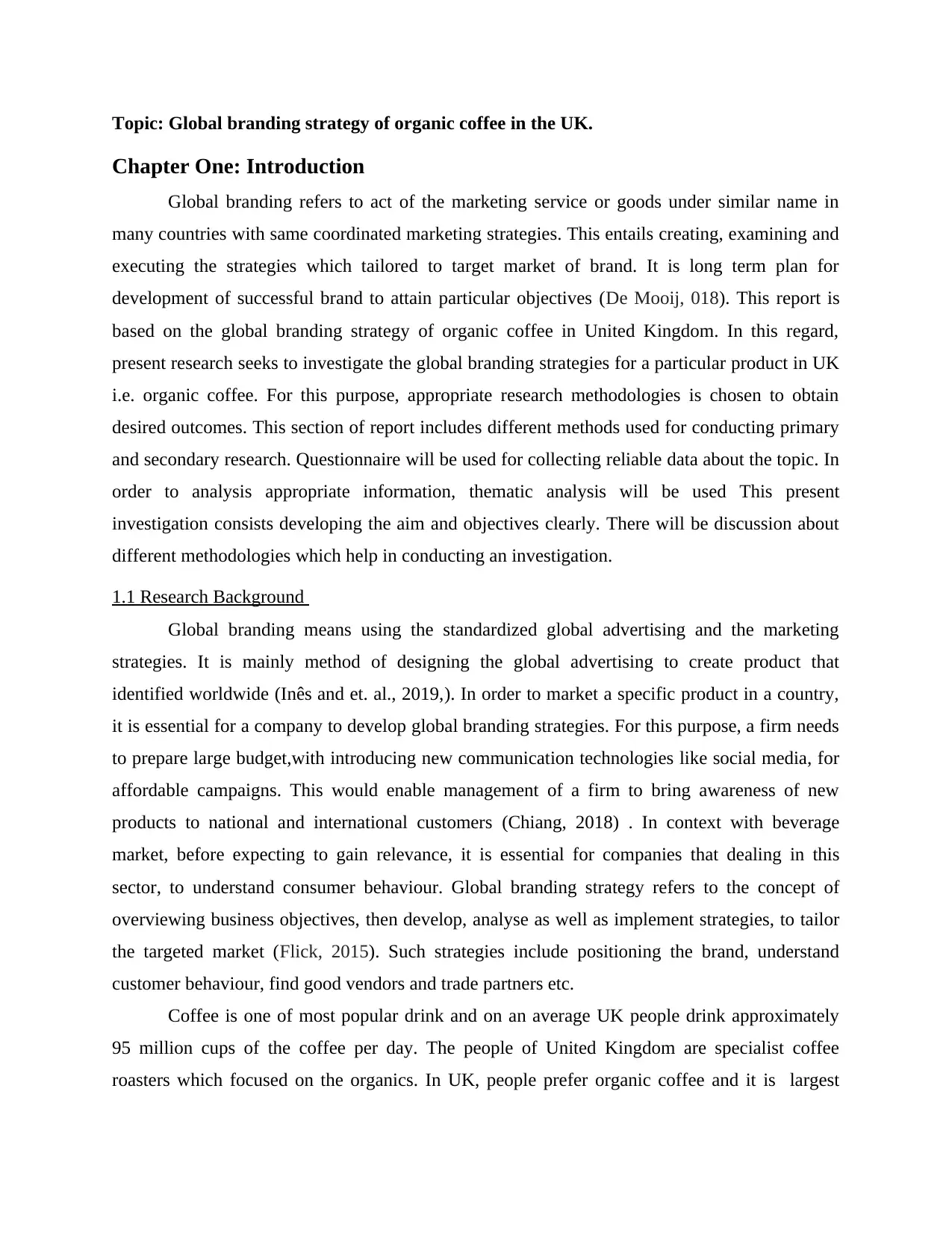
Topic: Global branding strategy of organic coffee in the UK.
Chapter One: Introduction
Global branding refers to act of the marketing service or goods under similar name in
many countries with same coordinated marketing strategies. This entails creating, examining and
executing the strategies which tailored to target market of brand. It is long term plan for
development of successful brand to attain particular objectives (De Mooij, 018). This report is
based on the global branding strategy of organic coffee in United Kingdom. In this regard,
present research seeks to investigate the global branding strategies for a particular product in UK
i.e. organic coffee. For this purpose, appropriate research methodologies is chosen to obtain
desired outcomes. This section of report includes different methods used for conducting primary
and secondary research. Questionnaire will be used for collecting reliable data about the topic. In
order to analysis appropriate information, thematic analysis will be used This present
investigation consists developing the aim and objectives clearly. There will be discussion about
different methodologies which help in conducting an investigation.
1.1 Research Background
Global branding means using the standardized global advertising and the marketing
strategies. It is mainly method of designing the global advertising to create product that
identified worldwide (Inês and et. al., 2019,). In order to market a specific product in a country,
it is essential for a company to develop global branding strategies. For this purpose, a firm needs
to prepare large budget,with introducing new communication technologies like social media, for
affordable campaigns. This would enable management of a firm to bring awareness of new
products to national and international customers (Chiang, 2018) . In context with beverage
market, before expecting to gain relevance, it is essential for companies that dealing in this
sector, to understand consumer behaviour. Global branding strategy refers to the concept of
overviewing business objectives, then develop, analyse as well as implement strategies, to tailor
the targeted market (Flick, 2015). Such strategies include positioning the brand, understand
customer behaviour, find good vendors and trade partners etc.
Coffee is one of most popular drink and on an average UK people drink approximately
95 million cups of the coffee per day. The people of United Kingdom are specialist coffee
roasters which focused on the organics. In UK, people prefer organic coffee and it is largest
Chapter One: Introduction
Global branding refers to act of the marketing service or goods under similar name in
many countries with same coordinated marketing strategies. This entails creating, examining and
executing the strategies which tailored to target market of brand. It is long term plan for
development of successful brand to attain particular objectives (De Mooij, 018). This report is
based on the global branding strategy of organic coffee in United Kingdom. In this regard,
present research seeks to investigate the global branding strategies for a particular product in UK
i.e. organic coffee. For this purpose, appropriate research methodologies is chosen to obtain
desired outcomes. This section of report includes different methods used for conducting primary
and secondary research. Questionnaire will be used for collecting reliable data about the topic. In
order to analysis appropriate information, thematic analysis will be used This present
investigation consists developing the aim and objectives clearly. There will be discussion about
different methodologies which help in conducting an investigation.
1.1 Research Background
Global branding means using the standardized global advertising and the marketing
strategies. It is mainly method of designing the global advertising to create product that
identified worldwide (Inês and et. al., 2019,). In order to market a specific product in a country,
it is essential for a company to develop global branding strategies. For this purpose, a firm needs
to prepare large budget,with introducing new communication technologies like social media, for
affordable campaigns. This would enable management of a firm to bring awareness of new
products to national and international customers (Chiang, 2018) . In context with beverage
market, before expecting to gain relevance, it is essential for companies that dealing in this
sector, to understand consumer behaviour. Global branding strategy refers to the concept of
overviewing business objectives, then develop, analyse as well as implement strategies, to tailor
the targeted market (Flick, 2015). Such strategies include positioning the brand, understand
customer behaviour, find good vendors and trade partners etc.
Coffee is one of most popular drink and on an average UK people drink approximately
95 million cups of the coffee per day. The people of United Kingdom are specialist coffee
roasters which focused on the organics. In UK, people prefer organic coffee and it is largest
⊘ This is a preview!⊘
Do you want full access?
Subscribe today to unlock all pages.

Trusted by 1+ million students worldwide
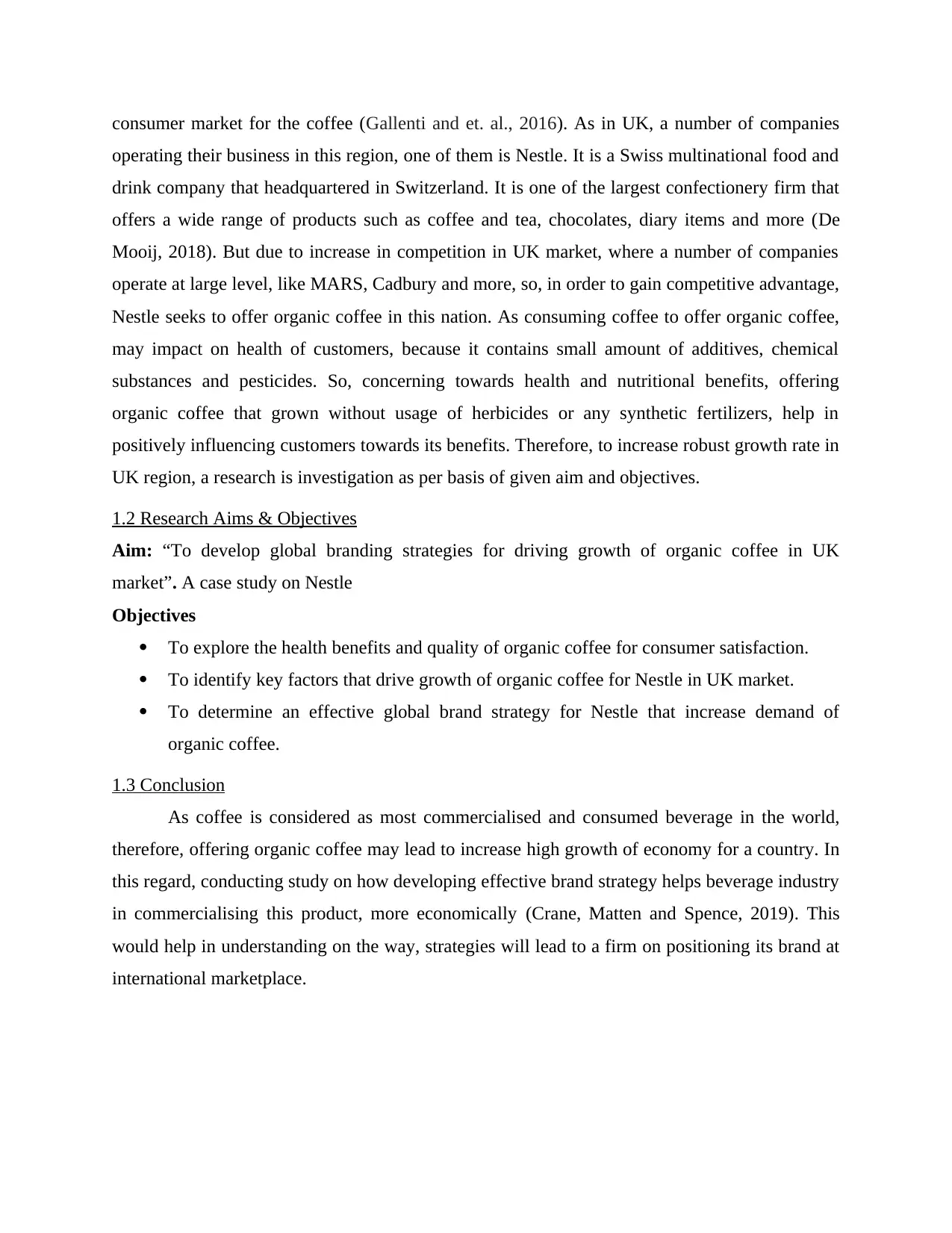
consumer market for the coffee (Gallenti and et. al., 2016). As in UK, a number of companies
operating their business in this region, one of them is Nestle. It is a Swiss multinational food and
drink company that headquartered in Switzerland. It is one of the largest confectionery firm that
offers a wide range of products such as coffee and tea, chocolates, diary items and more (De
Mooij, 2018). But due to increase in competition in UK market, where a number of companies
operate at large level, like MARS, Cadbury and more, so, in order to gain competitive advantage,
Nestle seeks to offer organic coffee in this nation. As consuming coffee to offer organic coffee,
may impact on health of customers, because it contains small amount of additives, chemical
substances and pesticides. So, concerning towards health and nutritional benefits, offering
organic coffee that grown without usage of herbicides or any synthetic fertilizers, help in
positively influencing customers towards its benefits. Therefore, to increase robust growth rate in
UK region, a research is investigation as per basis of given aim and objectives.
1.2 Research Aims & Objectives
Aim: “To develop global branding strategies for driving growth of organic coffee in UK
market”. A case study on Nestle
Objectives
To explore the health benefits and quality of organic coffee for consumer satisfaction.
To identify key factors that drive growth of organic coffee for Nestle in UK market.
To determine an effective global brand strategy for Nestle that increase demand of
organic coffee.
1.3 Conclusion
As coffee is considered as most commercialised and consumed beverage in the world,
therefore, offering organic coffee may lead to increase high growth of economy for a country. In
this regard, conducting study on how developing effective brand strategy helps beverage industry
in commercialising this product, more economically (Crane, Matten and Spence, 2019). This
would help in understanding on the way, strategies will lead to a firm on positioning its brand at
international marketplace.
operating their business in this region, one of them is Nestle. It is a Swiss multinational food and
drink company that headquartered in Switzerland. It is one of the largest confectionery firm that
offers a wide range of products such as coffee and tea, chocolates, diary items and more (De
Mooij, 2018). But due to increase in competition in UK market, where a number of companies
operate at large level, like MARS, Cadbury and more, so, in order to gain competitive advantage,
Nestle seeks to offer organic coffee in this nation. As consuming coffee to offer organic coffee,
may impact on health of customers, because it contains small amount of additives, chemical
substances and pesticides. So, concerning towards health and nutritional benefits, offering
organic coffee that grown without usage of herbicides or any synthetic fertilizers, help in
positively influencing customers towards its benefits. Therefore, to increase robust growth rate in
UK region, a research is investigation as per basis of given aim and objectives.
1.2 Research Aims & Objectives
Aim: “To develop global branding strategies for driving growth of organic coffee in UK
market”. A case study on Nestle
Objectives
To explore the health benefits and quality of organic coffee for consumer satisfaction.
To identify key factors that drive growth of organic coffee for Nestle in UK market.
To determine an effective global brand strategy for Nestle that increase demand of
organic coffee.
1.3 Conclusion
As coffee is considered as most commercialised and consumed beverage in the world,
therefore, offering organic coffee may lead to increase high growth of economy for a country. In
this regard, conducting study on how developing effective brand strategy helps beverage industry
in commercialising this product, more economically (Crane, Matten and Spence, 2019). This
would help in understanding on the way, strategies will lead to a firm on positioning its brand at
international marketplace.
Paraphrase This Document
Need a fresh take? Get an instant paraphrase of this document with our AI Paraphraser
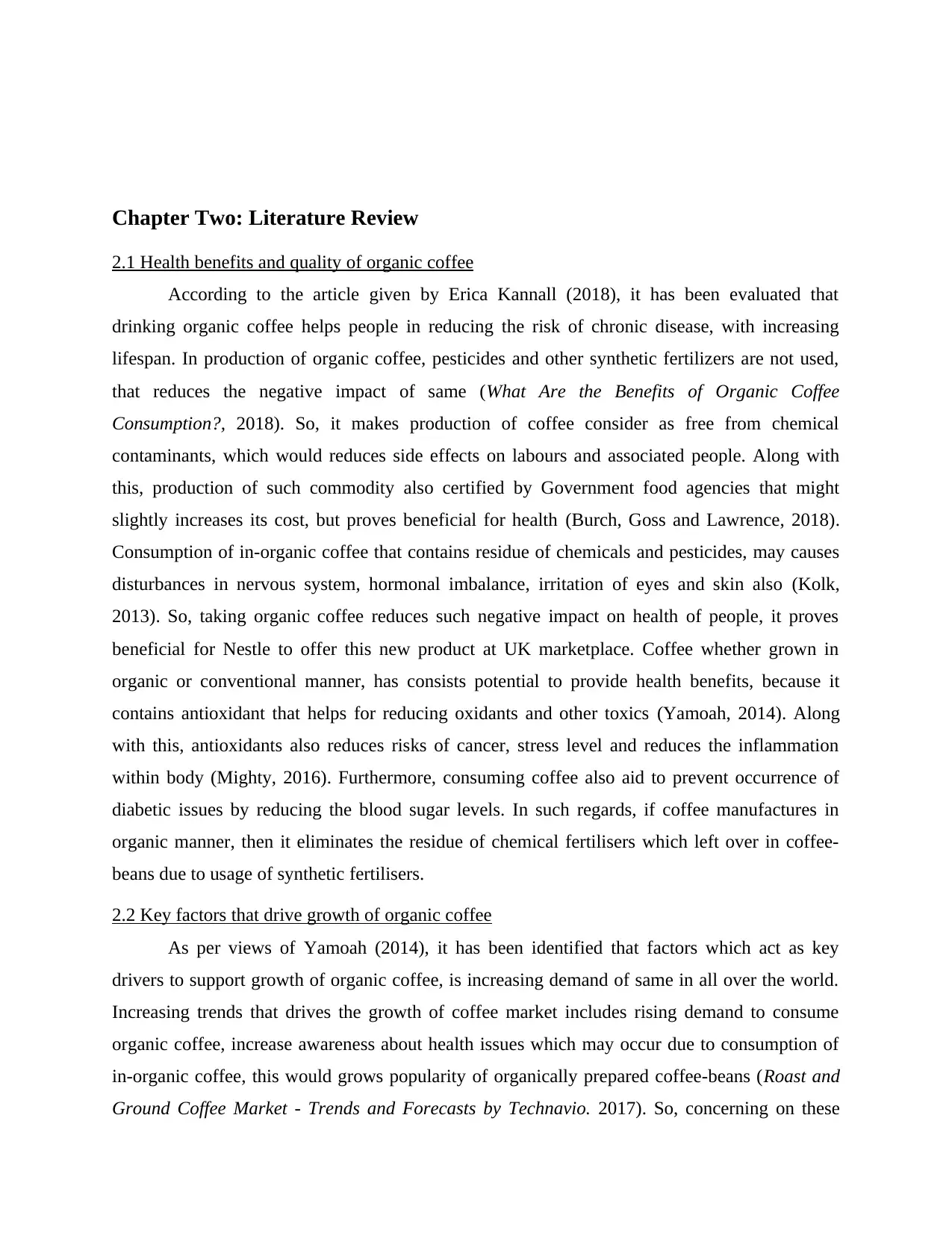
Chapter Two: Literature Review
2.1 Health benefits and quality of organic coffee
According to the article given by Erica Kannall (2018), it has been evaluated that
drinking organic coffee helps people in reducing the risk of chronic disease, with increasing
lifespan. In production of organic coffee, pesticides and other synthetic fertilizers are not used,
that reduces the negative impact of same (What Are the Benefits of Organic Coffee
Consumption?, 2018). So, it makes production of coffee consider as free from chemical
contaminants, which would reduces side effects on labours and associated people. Along with
this, production of such commodity also certified by Government food agencies that might
slightly increases its cost, but proves beneficial for health (Burch, Goss and Lawrence, 2018).
Consumption of in-organic coffee that contains residue of chemicals and pesticides, may causes
disturbances in nervous system, hormonal imbalance, irritation of eyes and skin also (Kolk,
2013). So, taking organic coffee reduces such negative impact on health of people, it proves
beneficial for Nestle to offer this new product at UK marketplace. Coffee whether grown in
organic or conventional manner, has consists potential to provide health benefits, because it
contains antioxidant that helps for reducing oxidants and other toxics (Yamoah, 2014). Along
with this, antioxidants also reduces risks of cancer, stress level and reduces the inflammation
within body (Mighty, 2016). Furthermore, consuming coffee also aid to prevent occurrence of
diabetic issues by reducing the blood sugar levels. In such regards, if coffee manufactures in
organic manner, then it eliminates the residue of chemical fertilisers which left over in coffee-
beans due to usage of synthetic fertilisers.
2.2 Key factors that drive growth of organic coffee
As per views of Yamoah (2014), it has been identified that factors which act as key
drivers to support growth of organic coffee, is increasing demand of same in all over the world.
Increasing trends that drives the growth of coffee market includes rising demand to consume
organic coffee, increase awareness about health issues which may occur due to consumption of
in-organic coffee, this would grows popularity of organically prepared coffee-beans (Roast and
Ground Coffee Market - Trends and Forecasts by Technavio. 2017). So, concerning on these
2.1 Health benefits and quality of organic coffee
According to the article given by Erica Kannall (2018), it has been evaluated that
drinking organic coffee helps people in reducing the risk of chronic disease, with increasing
lifespan. In production of organic coffee, pesticides and other synthetic fertilizers are not used,
that reduces the negative impact of same (What Are the Benefits of Organic Coffee
Consumption?, 2018). So, it makes production of coffee consider as free from chemical
contaminants, which would reduces side effects on labours and associated people. Along with
this, production of such commodity also certified by Government food agencies that might
slightly increases its cost, but proves beneficial for health (Burch, Goss and Lawrence, 2018).
Consumption of in-organic coffee that contains residue of chemicals and pesticides, may causes
disturbances in nervous system, hormonal imbalance, irritation of eyes and skin also (Kolk,
2013). So, taking organic coffee reduces such negative impact on health of people, it proves
beneficial for Nestle to offer this new product at UK marketplace. Coffee whether grown in
organic or conventional manner, has consists potential to provide health benefits, because it
contains antioxidant that helps for reducing oxidants and other toxics (Yamoah, 2014). Along
with this, antioxidants also reduces risks of cancer, stress level and reduces the inflammation
within body (Mighty, 2016). Furthermore, consuming coffee also aid to prevent occurrence of
diabetic issues by reducing the blood sugar levels. In such regards, if coffee manufactures in
organic manner, then it eliminates the residue of chemical fertilisers which left over in coffee-
beans due to usage of synthetic fertilisers.
2.2 Key factors that drive growth of organic coffee
As per views of Yamoah (2014), it has been identified that factors which act as key
drivers to support growth of organic coffee, is increasing demand of same in all over the world.
Increasing trends that drives the growth of coffee market includes rising demand to consume
organic coffee, increase awareness about health issues which may occur due to consumption of
in-organic coffee, this would grows popularity of organically prepared coffee-beans (Roast and
Ground Coffee Market - Trends and Forecasts by Technavio. 2017). So, concerning on these
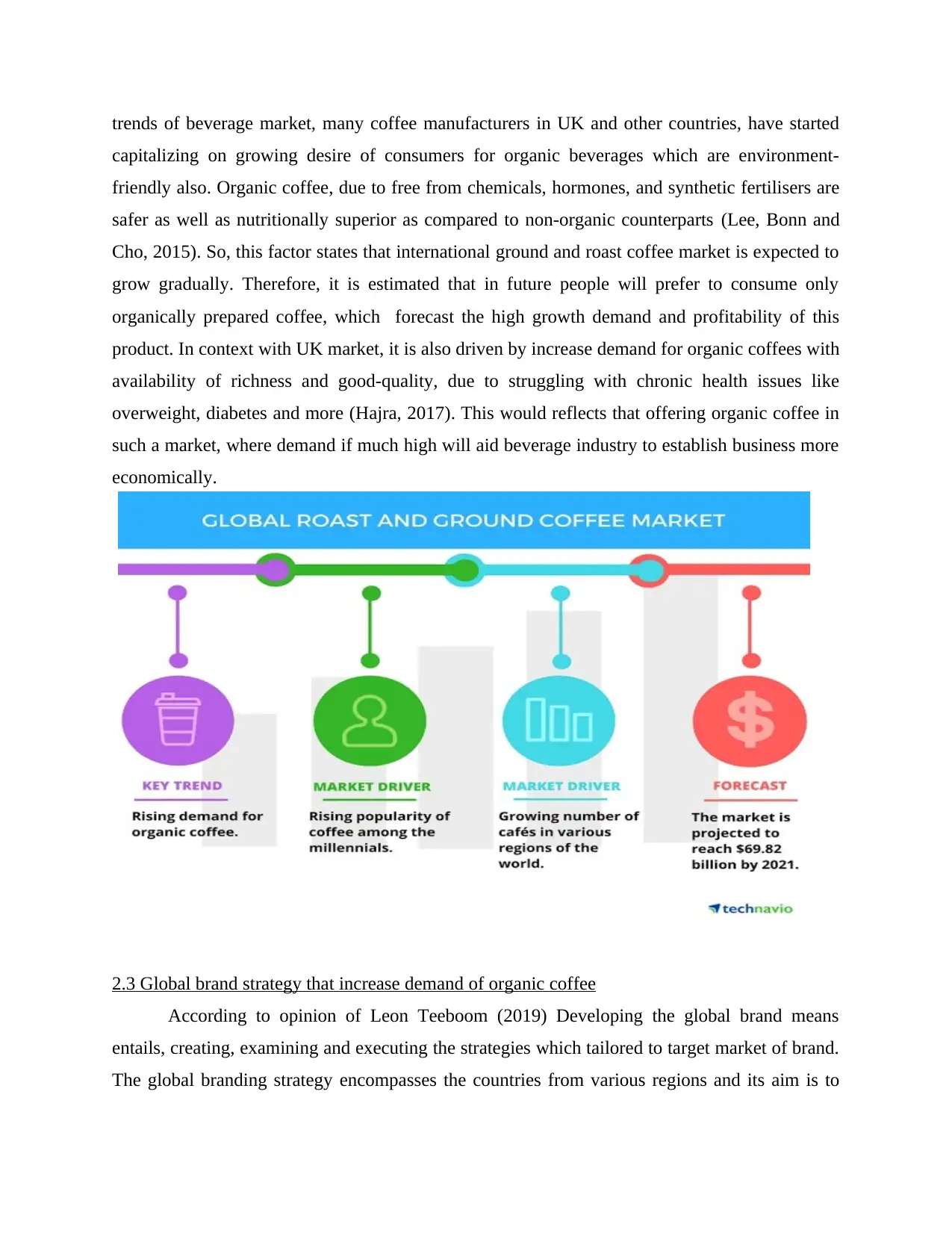
trends of beverage market, many coffee manufacturers in UK and other countries, have started
capitalizing on growing desire of consumers for organic beverages which are environment-
friendly also. Organic coffee, due to free from chemicals, hormones, and synthetic fertilisers are
safer as well as nutritionally superior as compared to non-organic counterparts (Lee, Bonn and
Cho, 2015). So, this factor states that international ground and roast coffee market is expected to
grow gradually. Therefore, it is estimated that in future people will prefer to consume only
organically prepared coffee, which forecast the high growth demand and profitability of this
product. In context with UK market, it is also driven by increase demand for organic coffees with
availability of richness and good-quality, due to struggling with chronic health issues like
overweight, diabetes and more (Hajra, 2017). This would reflects that offering organic coffee in
such a market, where demand if much high will aid beverage industry to establish business more
economically.
2.3 Global brand strategy that increase demand of organic coffee
According to opinion of Leon Teeboom (2019) Developing the global brand means
entails, creating, examining and executing the strategies which tailored to target market of brand.
The global branding strategy encompasses the countries from various regions and its aim is to
capitalizing on growing desire of consumers for organic beverages which are environment-
friendly also. Organic coffee, due to free from chemicals, hormones, and synthetic fertilisers are
safer as well as nutritionally superior as compared to non-organic counterparts (Lee, Bonn and
Cho, 2015). So, this factor states that international ground and roast coffee market is expected to
grow gradually. Therefore, it is estimated that in future people will prefer to consume only
organically prepared coffee, which forecast the high growth demand and profitability of this
product. In context with UK market, it is also driven by increase demand for organic coffees with
availability of richness and good-quality, due to struggling with chronic health issues like
overweight, diabetes and more (Hajra, 2017). This would reflects that offering organic coffee in
such a market, where demand if much high will aid beverage industry to establish business more
economically.
2.3 Global brand strategy that increase demand of organic coffee
According to opinion of Leon Teeboom (2019) Developing the global brand means
entails, creating, examining and executing the strategies which tailored to target market of brand.
The global branding strategy encompasses the countries from various regions and its aim is to
⊘ This is a preview!⊘
Do you want full access?
Subscribe today to unlock all pages.

Trusted by 1+ million students worldwide
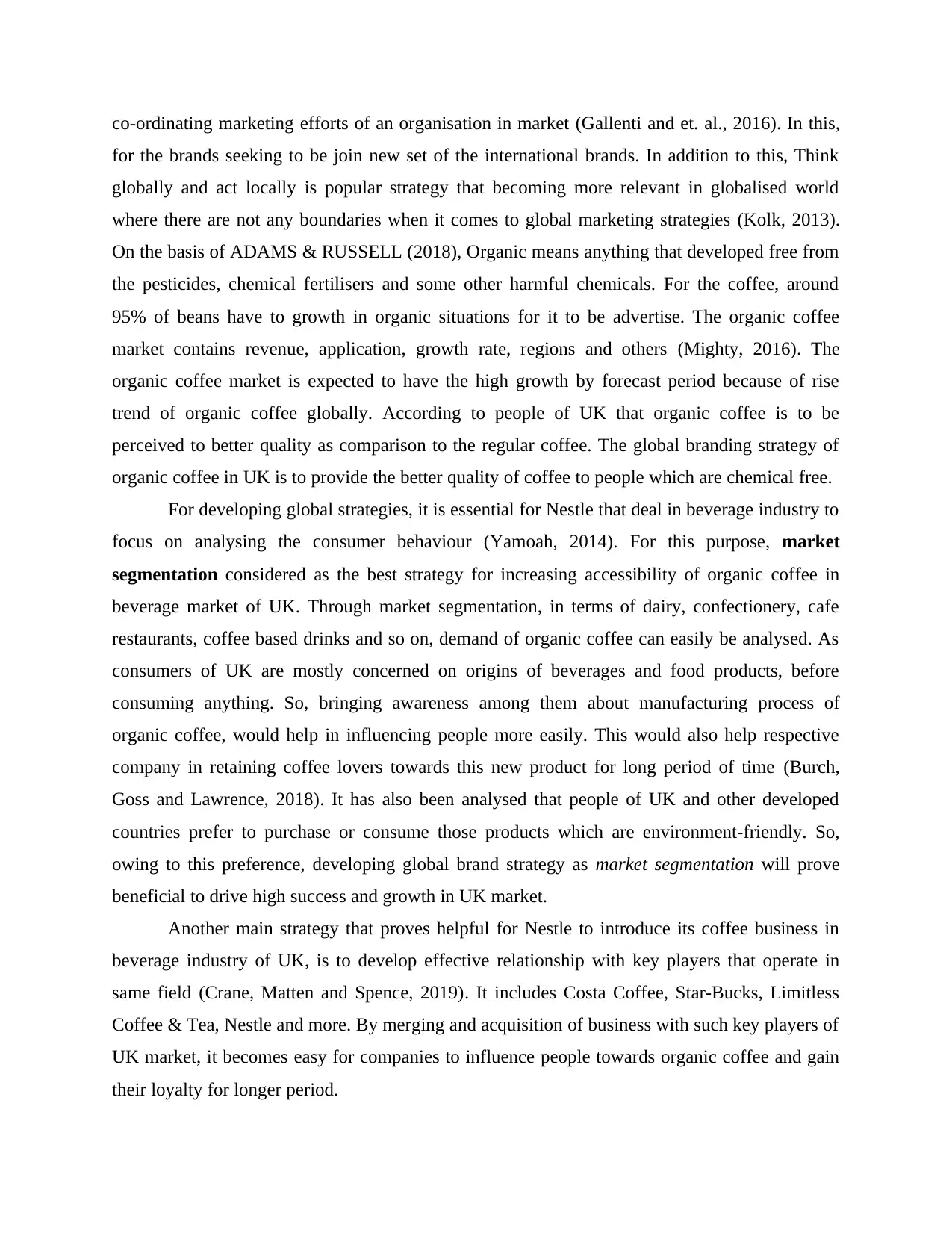
co-ordinating marketing efforts of an organisation in market (Gallenti and et. al., 2016). In this,
for the brands seeking to be join new set of the international brands. In addition to this, Think
globally and act locally is popular strategy that becoming more relevant in globalised world
where there are not any boundaries when it comes to global marketing strategies (Kolk, 2013).
On the basis of ADAMS & RUSSELL (2018), Organic means anything that developed free from
the pesticides, chemical fertilisers and some other harmful chemicals. For the coffee, around
95% of beans have to growth in organic situations for it to be advertise. The organic coffee
market contains revenue, application, growth rate, regions and others (Mighty, 2016). The
organic coffee market is expected to have the high growth by forecast period because of rise
trend of organic coffee globally. According to people of UK that organic coffee is to be
perceived to better quality as comparison to the regular coffee. The global branding strategy of
organic coffee in UK is to provide the better quality of coffee to people which are chemical free.
For developing global strategies, it is essential for Nestle that deal in beverage industry to
focus on analysing the consumer behaviour (Yamoah, 2014). For this purpose, market
segmentation considered as the best strategy for increasing accessibility of organic coffee in
beverage market of UK. Through market segmentation, in terms of dairy, confectionery, cafe
restaurants, coffee based drinks and so on, demand of organic coffee can easily be analysed. As
consumers of UK are mostly concerned on origins of beverages and food products, before
consuming anything. So, bringing awareness among them about manufacturing process of
organic coffee, would help in influencing people more easily. This would also help respective
company in retaining coffee lovers towards this new product for long period of time (Burch,
Goss and Lawrence, 2018). It has also been analysed that people of UK and other developed
countries prefer to purchase or consume those products which are environment-friendly. So,
owing to this preference, developing global brand strategy as market segmentation will prove
beneficial to drive high success and growth in UK market.
Another main strategy that proves helpful for Nestle to introduce its coffee business in
beverage industry of UK, is to develop effective relationship with key players that operate in
same field (Crane, Matten and Spence, 2019). It includes Costa Coffee, Star-Bucks, Limitless
Coffee & Tea, Nestle and more. By merging and acquisition of business with such key players of
UK market, it becomes easy for companies to influence people towards organic coffee and gain
their loyalty for longer period.
for the brands seeking to be join new set of the international brands. In addition to this, Think
globally and act locally is popular strategy that becoming more relevant in globalised world
where there are not any boundaries when it comes to global marketing strategies (Kolk, 2013).
On the basis of ADAMS & RUSSELL (2018), Organic means anything that developed free from
the pesticides, chemical fertilisers and some other harmful chemicals. For the coffee, around
95% of beans have to growth in organic situations for it to be advertise. The organic coffee
market contains revenue, application, growth rate, regions and others (Mighty, 2016). The
organic coffee market is expected to have the high growth by forecast period because of rise
trend of organic coffee globally. According to people of UK that organic coffee is to be
perceived to better quality as comparison to the regular coffee. The global branding strategy of
organic coffee in UK is to provide the better quality of coffee to people which are chemical free.
For developing global strategies, it is essential for Nestle that deal in beverage industry to
focus on analysing the consumer behaviour (Yamoah, 2014). For this purpose, market
segmentation considered as the best strategy for increasing accessibility of organic coffee in
beverage market of UK. Through market segmentation, in terms of dairy, confectionery, cafe
restaurants, coffee based drinks and so on, demand of organic coffee can easily be analysed. As
consumers of UK are mostly concerned on origins of beverages and food products, before
consuming anything. So, bringing awareness among them about manufacturing process of
organic coffee, would help in influencing people more easily. This would also help respective
company in retaining coffee lovers towards this new product for long period of time (Burch,
Goss and Lawrence, 2018). It has also been analysed that people of UK and other developed
countries prefer to purchase or consume those products which are environment-friendly. So,
owing to this preference, developing global brand strategy as market segmentation will prove
beneficial to drive high success and growth in UK market.
Another main strategy that proves helpful for Nestle to introduce its coffee business in
beverage industry of UK, is to develop effective relationship with key players that operate in
same field (Crane, Matten and Spence, 2019). It includes Costa Coffee, Star-Bucks, Limitless
Coffee & Tea, Nestle and more. By merging and acquisition of business with such key players of
UK market, it becomes easy for companies to influence people towards organic coffee and gain
their loyalty for longer period.
Paraphrase This Document
Need a fresh take? Get an instant paraphrase of this document with our AI Paraphraser
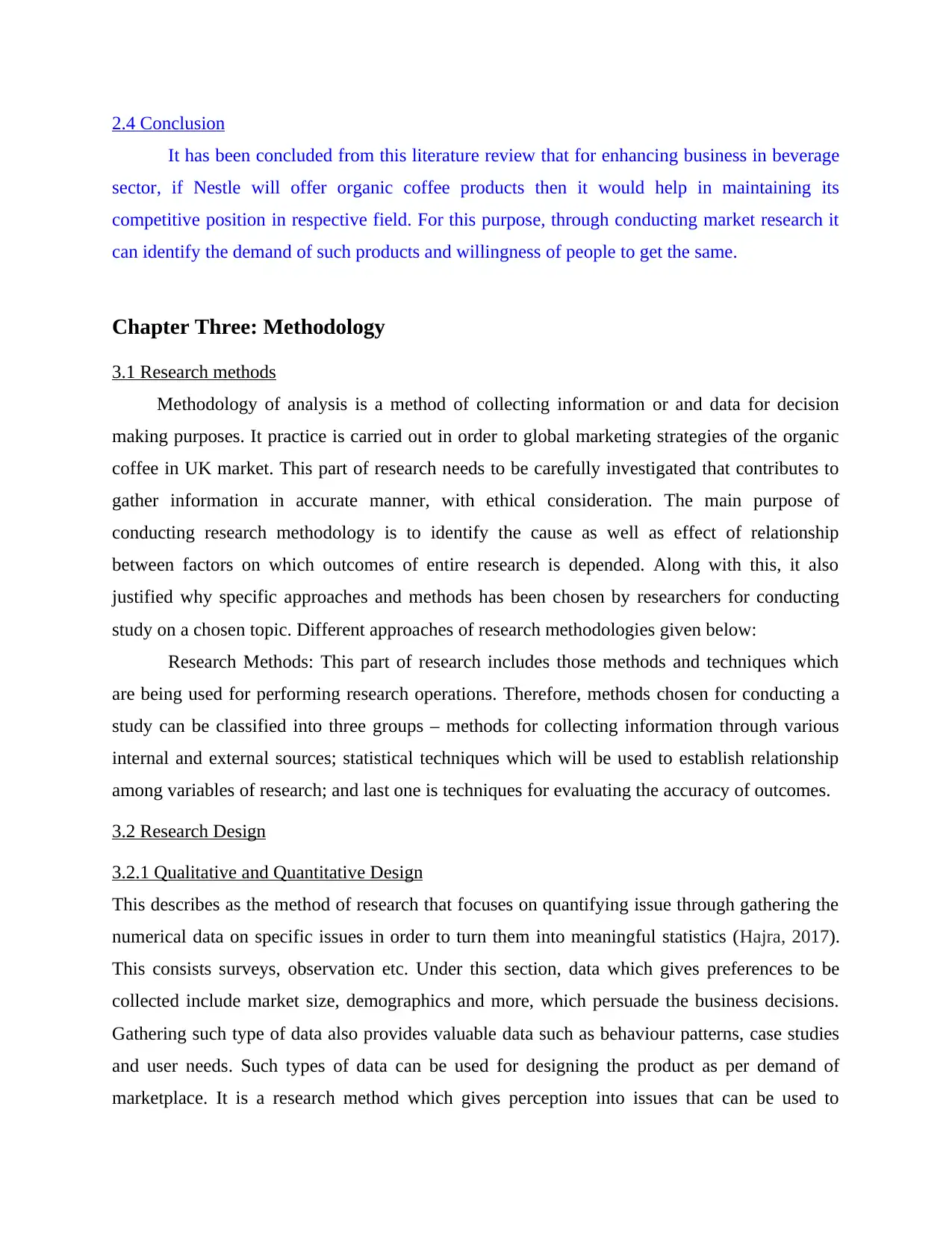
2.4 Conclusion
It has been concluded from this literature review that for enhancing business in beverage
sector, if Nestle will offer organic coffee products then it would help in maintaining its
competitive position in respective field. For this purpose, through conducting market research it
can identify the demand of such products and willingness of people to get the same.
Chapter Three: Methodology
3.1 Research methods
Methodology of analysis is a method of collecting information or and data for decision
making purposes. It practice is carried out in order to global marketing strategies of the organic
coffee in UK market. This part of research needs to be carefully investigated that contributes to
gather information in accurate manner, with ethical consideration. The main purpose of
conducting research methodology is to identify the cause as well as effect of relationship
between factors on which outcomes of entire research is depended. Along with this, it also
justified why specific approaches and methods has been chosen by researchers for conducting
study on a chosen topic. Different approaches of research methodologies given below:
Research Methods: This part of research includes those methods and techniques which
are being used for performing research operations. Therefore, methods chosen for conducting a
study can be classified into three groups – methods for collecting information through various
internal and external sources; statistical techniques which will be used to establish relationship
among variables of research; and last one is techniques for evaluating the accuracy of outcomes.
3.2 Research Design
3.2.1 Qualitative and Quantitative Design
This describes as the method of research that focuses on quantifying issue through gathering the
numerical data on specific issues in order to turn them into meaningful statistics (Hajra, 2017).
This consists surveys, observation etc. Under this section, data which gives preferences to be
collected include market size, demographics and more, which persuade the business decisions.
Gathering such type of data also provides valuable data such as behaviour patterns, case studies
and user needs. Such types of data can be used for designing the product as per demand of
marketplace. It is a research method which gives perception into issues that can be used to
It has been concluded from this literature review that for enhancing business in beverage
sector, if Nestle will offer organic coffee products then it would help in maintaining its
competitive position in respective field. For this purpose, through conducting market research it
can identify the demand of such products and willingness of people to get the same.
Chapter Three: Methodology
3.1 Research methods
Methodology of analysis is a method of collecting information or and data for decision
making purposes. It practice is carried out in order to global marketing strategies of the organic
coffee in UK market. This part of research needs to be carefully investigated that contributes to
gather information in accurate manner, with ethical consideration. The main purpose of
conducting research methodology is to identify the cause as well as effect of relationship
between factors on which outcomes of entire research is depended. Along with this, it also
justified why specific approaches and methods has been chosen by researchers for conducting
study on a chosen topic. Different approaches of research methodologies given below:
Research Methods: This part of research includes those methods and techniques which
are being used for performing research operations. Therefore, methods chosen for conducting a
study can be classified into three groups – methods for collecting information through various
internal and external sources; statistical techniques which will be used to establish relationship
among variables of research; and last one is techniques for evaluating the accuracy of outcomes.
3.2 Research Design
3.2.1 Qualitative and Quantitative Design
This describes as the method of research that focuses on quantifying issue through gathering the
numerical data on specific issues in order to turn them into meaningful statistics (Hajra, 2017).
This consists surveys, observation etc. Under this section, data which gives preferences to be
collected include market size, demographics and more, which persuade the business decisions.
Gathering such type of data also provides valuable data such as behaviour patterns, case studies
and user needs. Such types of data can be used for designing the product as per demand of
marketplace. It is a research method which gives perception into issues that can be used to
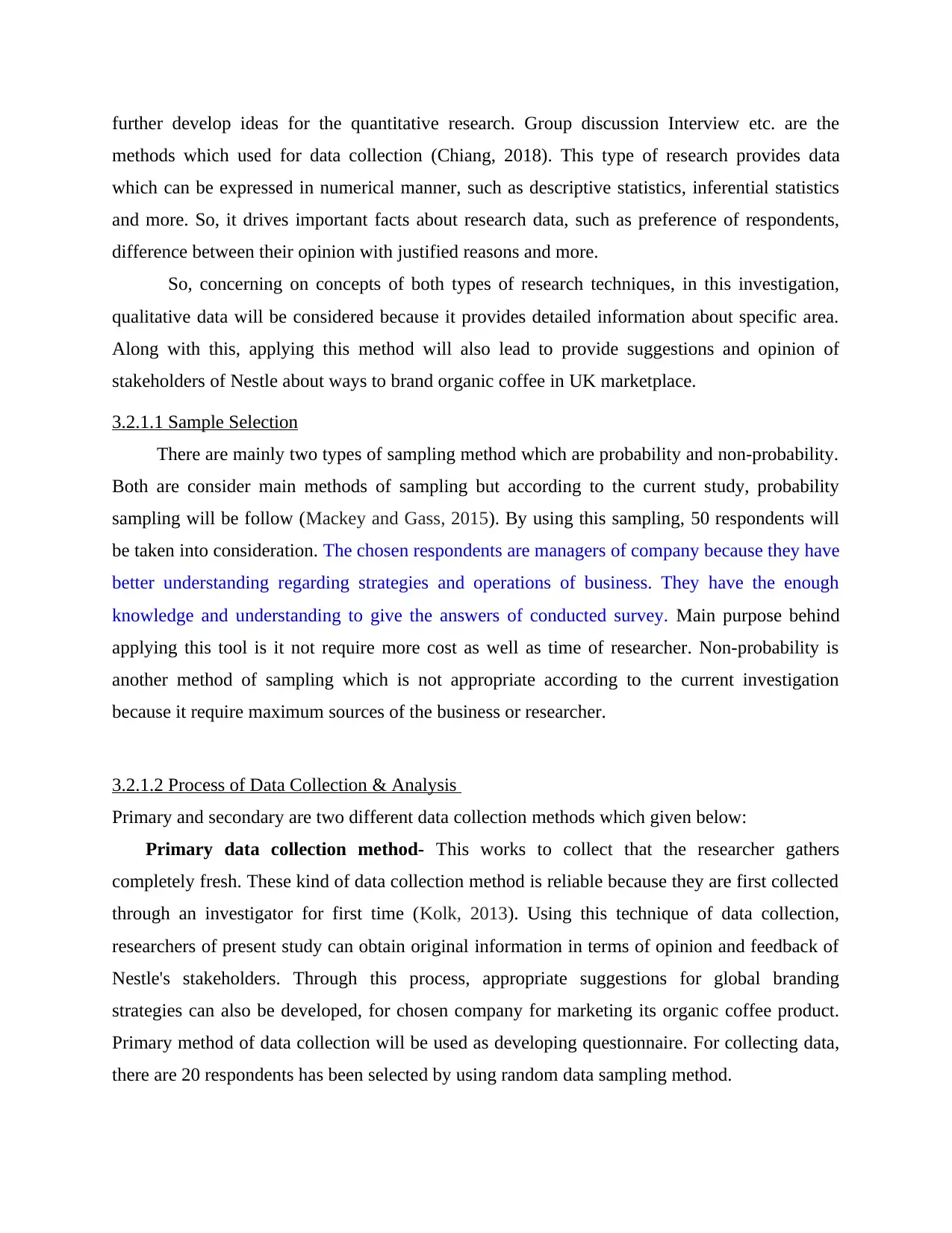
further develop ideas for the quantitative research. Group discussion Interview etc. are the
methods which used for data collection (Chiang, 2018). This type of research provides data
which can be expressed in numerical manner, such as descriptive statistics, inferential statistics
and more. So, it drives important facts about research data, such as preference of respondents,
difference between their opinion with justified reasons and more.
So, concerning on concepts of both types of research techniques, in this investigation,
qualitative data will be considered because it provides detailed information about specific area.
Along with this, applying this method will also lead to provide suggestions and opinion of
stakeholders of Nestle about ways to brand organic coffee in UK marketplace.
3.2.1.1 Sample Selection
There are mainly two types of sampling method which are probability and non-probability.
Both are consider main methods of sampling but according to the current study, probability
sampling will be follow (Mackey and Gass, 2015). By using this sampling, 50 respondents will
be taken into consideration. The chosen respondents are managers of company because they have
better understanding regarding strategies and operations of business. They have the enough
knowledge and understanding to give the answers of conducted survey. Main purpose behind
applying this tool is it not require more cost as well as time of researcher. Non-probability is
another method of sampling which is not appropriate according to the current investigation
because it require maximum sources of the business or researcher.
3.2.1.2 Process of Data Collection & Analysis
Primary and secondary are two different data collection methods which given below:
Primary data collection method- This works to collect that the researcher gathers
completely fresh. These kind of data collection method is reliable because they are first collected
through an investigator for first time (Kolk, 2013). Using this technique of data collection,
researchers of present study can obtain original information in terms of opinion and feedback of
Nestle's stakeholders. Through this process, appropriate suggestions for global branding
strategies can also be developed, for chosen company for marketing its organic coffee product.
Primary method of data collection will be used as developing questionnaire. For collecting data,
there are 20 respondents has been selected by using random data sampling method.
methods which used for data collection (Chiang, 2018). This type of research provides data
which can be expressed in numerical manner, such as descriptive statistics, inferential statistics
and more. So, it drives important facts about research data, such as preference of respondents,
difference between their opinion with justified reasons and more.
So, concerning on concepts of both types of research techniques, in this investigation,
qualitative data will be considered because it provides detailed information about specific area.
Along with this, applying this method will also lead to provide suggestions and opinion of
stakeholders of Nestle about ways to brand organic coffee in UK marketplace.
3.2.1.1 Sample Selection
There are mainly two types of sampling method which are probability and non-probability.
Both are consider main methods of sampling but according to the current study, probability
sampling will be follow (Mackey and Gass, 2015). By using this sampling, 50 respondents will
be taken into consideration. The chosen respondents are managers of company because they have
better understanding regarding strategies and operations of business. They have the enough
knowledge and understanding to give the answers of conducted survey. Main purpose behind
applying this tool is it not require more cost as well as time of researcher. Non-probability is
another method of sampling which is not appropriate according to the current investigation
because it require maximum sources of the business or researcher.
3.2.1.2 Process of Data Collection & Analysis
Primary and secondary are two different data collection methods which given below:
Primary data collection method- This works to collect that the researcher gathers
completely fresh. These kind of data collection method is reliable because they are first collected
through an investigator for first time (Kolk, 2013). Using this technique of data collection,
researchers of present study can obtain original information in terms of opinion and feedback of
Nestle's stakeholders. Through this process, appropriate suggestions for global branding
strategies can also be developed, for chosen company for marketing its organic coffee product.
Primary method of data collection will be used as developing questionnaire. For collecting data,
there are 20 respondents has been selected by using random data sampling method.
⊘ This is a preview!⊘
Do you want full access?
Subscribe today to unlock all pages.

Trusted by 1+ million students worldwide
1 out of 27
Related Documents
Your All-in-One AI-Powered Toolkit for Academic Success.
+13062052269
info@desklib.com
Available 24*7 on WhatsApp / Email
![[object Object]](/_next/static/media/star-bottom.7253800d.svg)
Unlock your academic potential
Copyright © 2020–2026 A2Z Services. All Rights Reserved. Developed and managed by ZUCOL.





